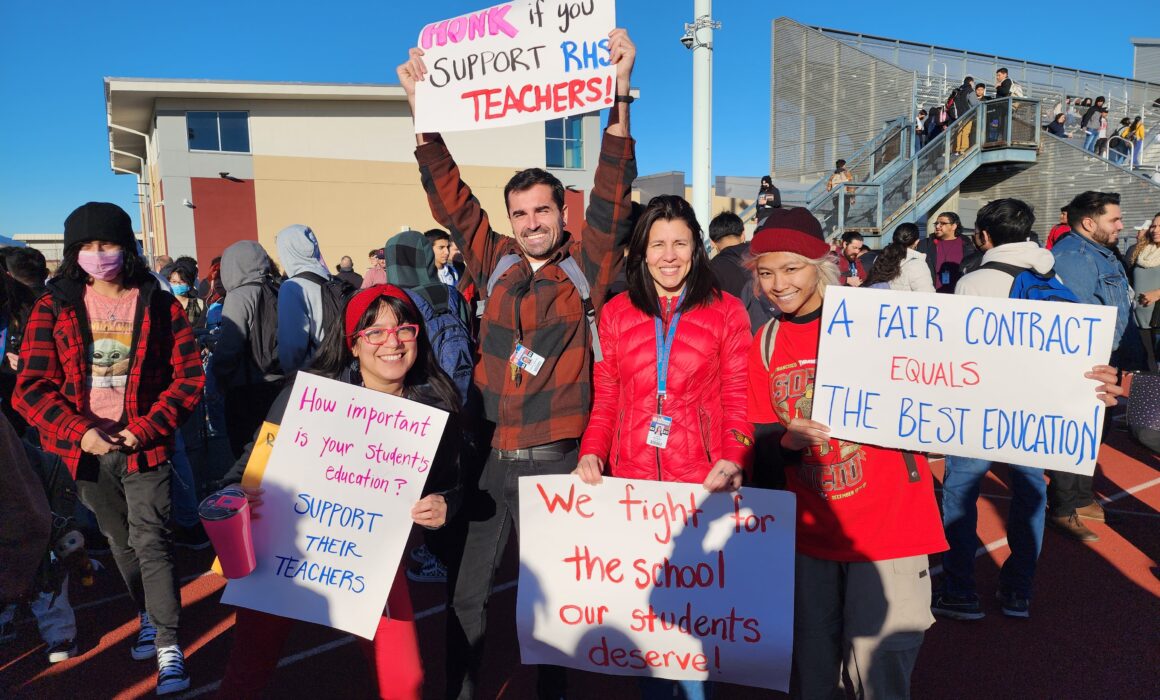
UNITED TEACHERS OF RICHMOND (UTR) asked West Contra Costa Unified School District management to take a leap of faith together on building the community schools their students deserve, and the district agreed — outlining the process for shared leadership in a new article in their recently ratified contract.
The result is five new pages of the UTR contract (in effect through June 2027 or until state funding expires) that lays out how the district will move forward in collaboration with educators, students, parents and community to build transformative community schools that are tailored to student and family needs. The contractual agreement on shared governance is one of the most robust in the state, which is appropriate for a district that was just recognized by the state as a model for community schools work.
“I’m really excited for us to be leaders in the state in building community schools. People really care about it because they know education is more than just math and reading lessons,” UTR President John Zabala says, explaining that the community schools model aligns well with long-established and embraced district values. “We also believe in this wholeheartedly. It was one of the cornerstones of our campaign.”
UTR set out when it started bargaining last year with a three-pronged strategy: physically and emotionally safe schools; permanent, certificated educators in every classroom; and uplifting community voice through shared decision-making (see bargaining recap on Page 43). Zabala says UTR leaders knew that it was going to be a tough bargain and they built a structure to engage and mobilize their members, and organize to win.
“We were fighting not only for the students in this community, but across the state as well, and people were lifting us up.” – United Teachers of Richmond President John Zabala
Utilizing resources from the NEA Strategic Campaign Institute for Community Schools, UTR executed a three-phase campaign that included engaging their membership and mobilizing, increasing public pressure and building relationships with parents and the community, and preparing for the possibility of a job action to achieve their goals. In November 2022, after the district declared impasse, UTR took a strike authorization vote — with more than 90 percent of members voting, 97.3 percent voted to authorize a strike. They continued building power, culminating in a January rally outside the school board meeting that attracted more than half of UTR’s 1,500 members.
“That made the difference,” Zabala says. “In many ways, our strategic plan played out almost exactly as we anticipated.”
For community schools, Zabala says there was conceptual agreement going into negotiations, especially since the district was already providing many similar services. He says a big moment was helping management to see that collaboration on community schools is a victory for the school district, its students and everyone who supports them.
“We told them, ‘This is about building on the success we already have.’ It’s a win for the district, not just in engaging families but in providing these services,” Zabala says. “We had to take the leap of faith together that this is justice.”
Just as the community schools model requires stakeholders to step out of their traditional roles to collaboratively identify and support student and community needs, Zabala says UTR’s work to reach agreement with district management also required both to break out of their roles as labor and management, and work together toward an end goal.
“There’s something really liberating about that,” Zabala says.
As UTR organized to win community schools and other resources, Zabala says it was moving to see how CTA worked to bolster their efforts, whether it was neighboring locals and leaders joining UTR rallies, CTA staff providing advice and support, or weekly phone calls with United Teachers Los Angeles leader Alex Caputo-Pearl, who serves as a coach through NEA..
“We’re not alone. If we need something, we can reach out and we will have help. It’s really powerful,” Zabala says. “We were fighting not only for the students in this community, but across the state as well, and people were lifting us up.”
Questions about UTR’s community schools article or how they won agreement? Contact Zabala directly at president@unitedteachersofrichmond.org.



The Discussion 0 comments Post a Comment